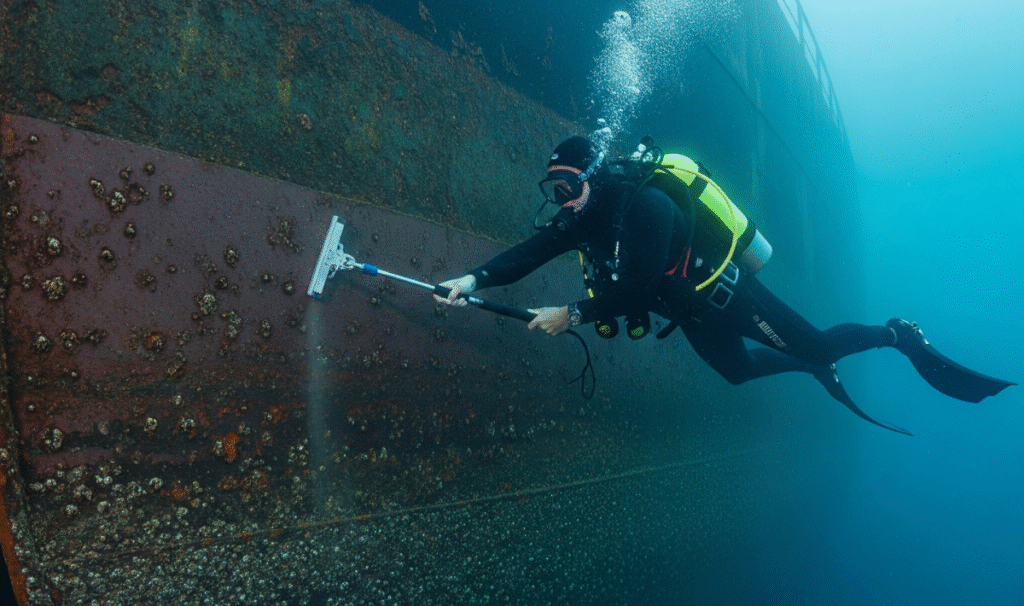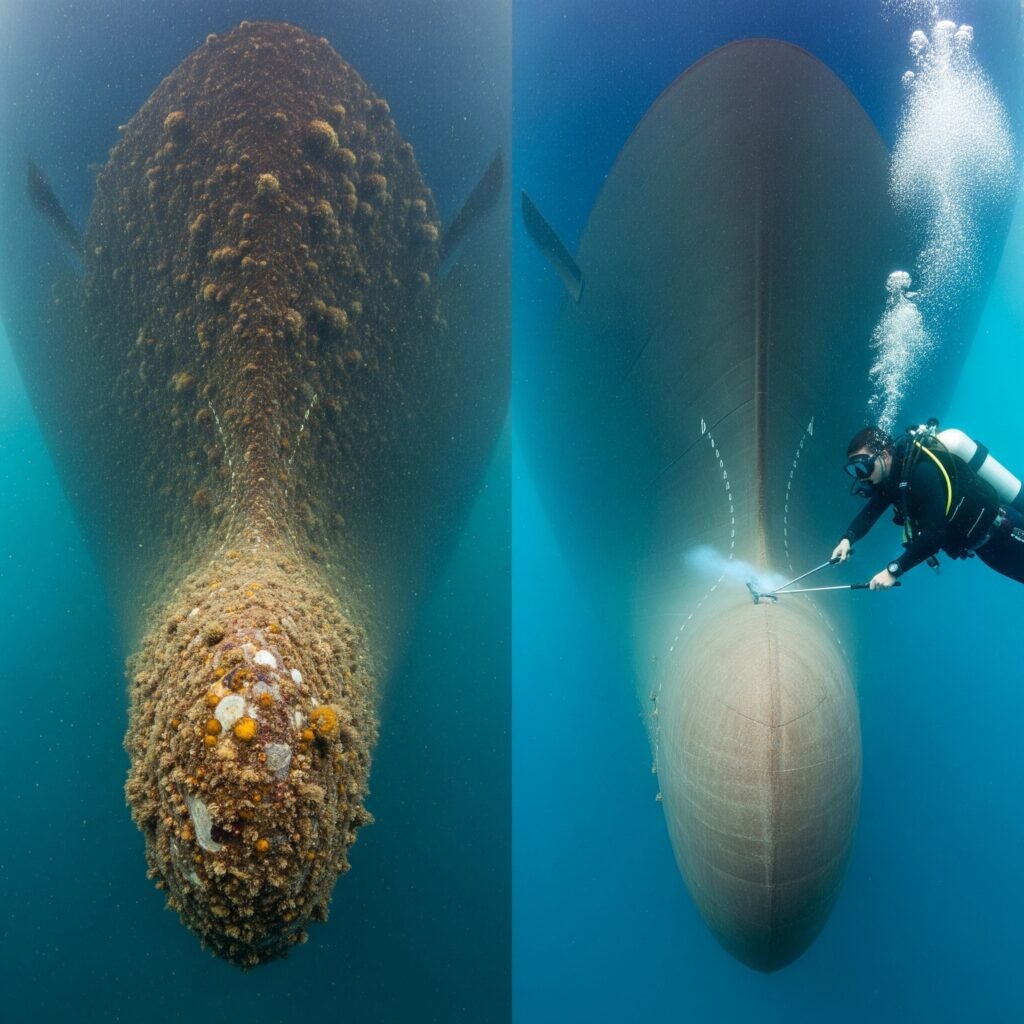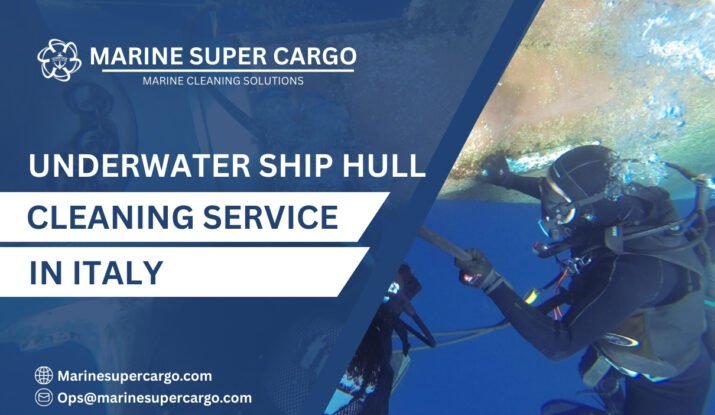Imagine your vessel gliding past the sun-drenched harbors of Genoa or weaving through Venice’s storied canals. Italy’s seas are alive with history, commerce, and stunning biodiversity. But beneath those inviting blue waves, a silent struggle unfolds—biofouling. If you own, manage, or work on ships in Italy, it’s a battle you can’t afford to lose. Yet the solution—underwater ship hull cleaning in Italy—brings hidden dangers no captain should ignore.
Let’s set sail through the bustling world of hull maintenance and uncover the underwater ship hull cleaning in Italy. Here’s how to protect your livelihood, your ship, and la bella Italia’s world-famous waters.
Italy’s coastlines are legendary. Yet every ship slicing through the Tyrrhenian or docked in Naples fights an invisible enemy. Marine life, from barnacles to stubborn algae, clings to every unprotected inch below the waterline. While a regular cleaning might seem like a simple fix, doing it wrong can create a cascade of risks with far-reaching consequences.
Why Underwater Ship Hull Cleaning in Italy Is a Maritime Must
Biofouling: The Hidden Enemy
Biofouling acts like a secret drag—you might not see it from the bridge, but your fuel bills and engine strain tell the tale. Even a thin layer of slime or barnacles can rob a ship of 10% or more of its efficiency. In busy Italian routes, lost speed means missed schedules and lost profit. That’s why underwater ship hull cleaning in Italy isn’t negotiable; it’s necessary.

Italy’s Bustling Ports and Unique Marine Ecosystems
From Trieste to Palermo, Italian ports are gateways to the Mediterranean. They’re also hot spots for marine biodiversity. But intensive shipping, changing water temperatures, and heavy traffic make these ecosystems sensitive. Every cleaning operation—even the smallest—has ripple effects that can reach far beyond one hull.
Environmental Harm—A Ripple with Wide Effects
Toxic Discharge and Threats to Italian Marine Biodiversity
Routine underwater hull cleaning can unleash a cloud of toxins, scraped-off paint, and biological debris. Many anti-fouling paints contain copper or biocides—great at killing marine gunk but toxic to fish, seagrass, and the foundation of the Mediterranean’s food web. MARPOL and IMO (imo.org) set international limits and capture requirements, but mistakes still happen—especially when operators skip eco-friendly capture technology.
Invasive Species Spread in the Mediterranean
Italy’s shipping lanes connect continents and oceans. When biofouling is brushed off without proper containment during underwater ship hull cleaning in Italy, invasive species can hitch a ride to new ports. Mussels, barnacles, and algae can outcompete native species, threatening fisheries, tourism, and even ancient underwater ruins. According to Marine Insight – MARPOL Convention, this is an escalating concern.
Structural Damage & Operational Hazards
Hull Coating Loss & Accelerated Corrosion
Cleaning is supposed to protect. But harsh brushes, improper tools, or overzealous divers can do serious damage, stripping away expensive anti-fouling protection and exposing steel to Italy’s salty embrace. The resulting corrosion and pitting can reduce vessel life, add to maintenance bills, and—even worse—create undetected weak spots.
Diver and Crew Safety in Italian Waters
The people in the water during underwater ship hull cleaning in Italy face real dangers. Poor visibility in busy ports, rope and propeller hazards, or sudden currents can turn a routine clean into a life-threatening emergency. Only IMCA (imca-int.com) certified teams with rigorous safety training should ever carry out these underwater operations.
Regulatory and Legal Pitfalls
Italy enforces the Marine Pollution (MARPOL) Convention and all IMO environmental standards rigorously. Discharging debris, failing to mitigate pollution, or damaging protected species during underwater ship hull cleaning in Italy can result in severe legal repercussions.
Fines, Detentions, and Business Disruption
Authorities have the power to detain ships, levy heavy fines, or even suspend the operations of repeat offenders. News of violations travels swiftly through Italy’s tightly-knit maritime community, risking contracts and reputation.
Global Best Practice: IMCA, IMO, and MARPOL Compliance in Italy
All responsible ship operators and cleaning contractors in Italy follow international standards from IMCA, IMO, and MARPOL. This means:
- Certified diver teams.
- Use of environmentally safe, debris-capture technology.
- Complete recordkeeping and transparent reporting.
- Regular updates and compliance with changing laws.
Staying up to speed isn’t just smart—it’s essential for risk-free underwater ship hull cleaning in Italy.
Why Italy’s Coastline Makes These Risks Even More Critical
Italy’s harbors are some of the Mediterranean’s busiest and delicate. Venice’s lagoons, Liguria’s rocky bays, and Sicily’s reefs are not just stunning—they’re sensitive. Any contamination or invasive outbreak can devastate tourism, heritage, and the seafood sector. Thus, the risks of underwater ship hull cleaning in Italy are magnified by the very beauty they’re meant to protect.

Smart Solutions: Avoiding the Underwater Ship Hull Cleaning in Italy
What can you do to safeguard your ships, your crew, and Italy’s legendary coast?
- Book only IMCA-certified teams with a proven track record.
- Demand closed-circuit debris capture, never loose brushing.
- Check that all practices follow MARPOL, IMO, and Italian law.
- Set a regular hull cleaning schedule—don’t let biofouling get ahead of you.
- Keep records, request before-and-after documentation, and always value quality over convenience.
With these measures, underwater ship hull cleaning in Italy becomes not just routine, but a pillar of sustainable, profitable shipping.
Conclusion
Navigating Italy’s blue highways is both a privilege and a responsibility. By understanding and respecting the importance of underwater ship hull cleaning in Italy, you don’t just protect vessels—you safeguard history, livelihoods, and the unsung wonders of the sea. Clean wisely, comply fully, and rely on trusted partners like CleanShip.co to keep your journeys smoother, greener, and truly worthy of the Italian spirit.
FAQ:
Q1. How often should underwater ship hull cleaning in Italy be performed?
Major vessels benefit from inspections every 6 months, with cleaning as soon as fouling or performance issues are spotted.
Q2. Are robotic hull cleaning systems available in Italy?
Yes, many large ports have access to cutting-edge robotic and closed-capture systems that meet strict environmental and safety rules.
Q3. What kind of certifications should I require from a cleaning provider?
Look for IMCA and IMO compliance, detailed safety logs, and evidence of recent training in environmental protection.
Q4. What are the legal consequences for improper hull cleaning in Italy?
Possible consequences include port detentions, hefty fines, blacklisting, and reputation loss, as Italian authorities strictly enforce MARPOL and local laws.
Q5. Can underwater cleaning extend the life of my ship?
Absolutely—if performed correctly and regularly, it preserves coatings, protects steel, and keeps your vessel nimble and safe in Italy’s busy waters.


